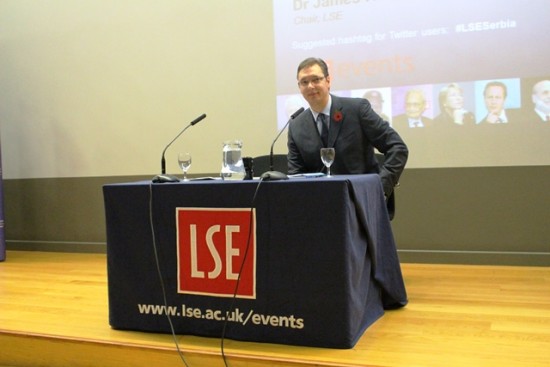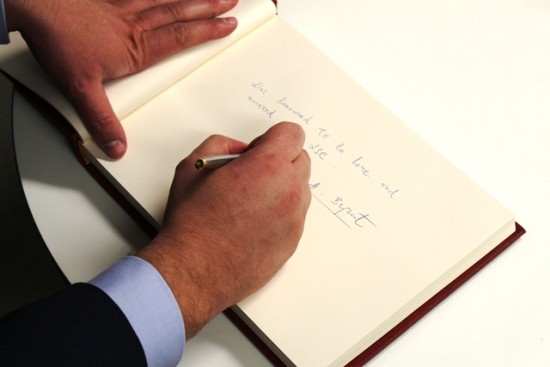 Dimitar Bechev gives his views on Aleksandar Vucic’s public lecture at the LSE, taken place on 27th Oct: “Vucic’s London trip confirms that he has been embraced by important EU capitals, perhaps as the lesser evil, or for lack of a credible alternative. That continues to dishearten liberals in Serbia who believe the country is backsliding”, he writes.
Dimitar Bechev gives his views on Aleksandar Vucic’s public lecture at the LSE, taken place on 27th Oct: “Vucic’s London trip confirms that he has been embraced by important EU capitals, perhaps as the lesser evil, or for lack of a credible alternative. That continues to dishearten liberals in Serbia who believe the country is backsliding”, he writes.

“I am changing every day, learning new things.” No, that is not an echo from Emir Kusturica’s 1981 classic Do You Remember Dolly Bell but one of the quotes from the speech that Serbia’s Prime Minister, Aleksandar Vucic, made at the London School of Economics, LSE, on Monday.
Facing a packed hall, Serbia’s leader projected confidence, fending off tough questions on media freedom, recalling how the government handled the recent Gay Pride Parade and underscoring the fact that the ballot box has confirmed his popular legitimacy.
Vucic focused on the economy and underscored his resolve to make Serbia a top performer in this field. “We want to lead in building highways, attracting investment and agriculture,” he said.
He waxed lyrical about his early days as an ambitious young man, working at a London corner shop, only to make it to the top of Serbian politics. Indeed, he drew an implicit parallel that between his personal story and Serbia’s drive to succeed.
He highlighted legislative changes in areas such as privatisation, the labour market and bankruptcy regulations as the key to success, adding that Air Serbia is by far the best carrier in the region.

While some might dismiss his rhetoric as a PR effort to charm a British audience, on another level it points to a narrative shift. Vucic and his Serbian Progressive Party originally gained traction with the West by playing along on Kosovo.
But the EU-led talks on “normalisation” of ties with Pristina are now on hold while the politicians in Kosovo wrangle over the formation of a new government. Meanwhile, the drama at the recent Serbia-Albania Euro 2016 qualifier match has fanned nationalist passions.
The Prime Minister did say a few words about the match and about Albania, Kosovo, Bosnia and the rest of the Western Balkans but clearly that was not his main selling point. Vucic the reformer has come to replace Vucic the peacemaker.
We have yet to see how far the effort to curb the fiscal deficit, restructure loss-making state enterprises and boost competitiveness will go, however. It is not inconceivable that the government’s zeal for reform will wear thin as the winter sets in and as popular discontent picks up.
Cuts in public-sector wages and pensions announced last year may convince the IMF that Serbia is on the right track and merits an accord. They may well not succeed in rekindling growth and drawing foreign investors, which is reportedly the primary goal of Vucic’s trip to London. (He was adamant that Serbia has undertaken fiscal consolidation of its own volition, not under a diktat.)
Relations with Russia were also in the spotlight. Vucic was unapologetic about Serbia’s warm ties to Moscow and talked at length about the benefits of such massive energy projects as the South Stream gas pipeline.
At the same time, he reiterated that Serbia’s long-term, strategic target is to join the European Union. He reminded everyone of his statement at the joint press conference with Vladimir Putin during the Russian President’s recent visit to Belgrade. But it is questionable whether Putin objects to Serbia’s EU ambitions. If anything, the Kremlin stands to gain from having a close friend in Brussels.
The image of the tough-talking leader who stands up to Western pressure to impose sanctions on Russia – and to Moscow’s perceived ambitions to divert Serbia from its EU path – is mostly aimed at public opinion at home. It implicitly evokes memories of President Tito’s non-aligned foreign policy and has resonance with older voters.
Vucic’s London trip confirms that he has been embraced by important EU capitals, perhaps as the lesser evil, or for lack of a credible alternative. That continues to dishearten liberals in Serbia who believe the country is backsliding.
We are yet to see whether their worst fears will come true – and whether the Faustian bargain between Vucic and the EU backfires on all parties involved.
This article was originally published on Balkan Insight.
Note: This article gives the views of the author, and not the position of LSEE Research on SEE, nor of the London School of Economics.
___________________________
Dimitar Bechev is Visiting Fellow at LSEE Research on South Eastern Europe, London School of Economics (LSE), and lectures in international politics at Sofia University. He was formerly Director of the Sofia Office at the European Council on Foreign Relations (ECFR) where he covered Turkey and the Western Balkans.



We are yet to see whether their worst fears will come true – and whether the Faustian bargain between Vucic and the EU backfires on all parties involved.